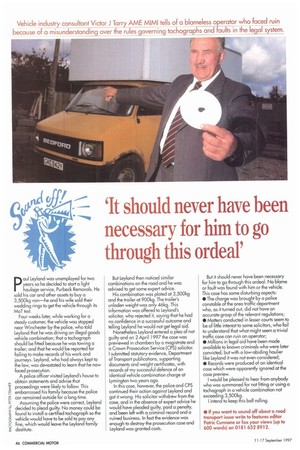'It should never have been necessary for him to go through this ordeal'
Page 58

If you've noticed an error in this article please click here to report it so we can fix it.
paul Leyland was unemployed for two years so he decided to start a light haulage service, Purbeck Removals. He sold his car and other assets to buy a 3,500k9 van—he and his wife sold their wedding rings to get the vehicle through its MoT test
Four weeks later, while working for a steady customer, the vehicle was stopped near Winchester by the police, who told Leyland that he was driving an illegal goods vehicle combination; that a tachograph should be fitted because he was towing a trailer; and that he would be reported for failing to make records of his work and journeys. Leyland, who had always kept to the law, was devastated to learn that he now faced prosecution. A police officer visited Leyland's house to obtain statements and advise that proceedings were likely to follow. This embarrassed his family because the police car remained outside for a long time.
Assuming the police were correct, Leyland decided to plead guilt( No money could be found to install a certified tachograph so the vehicle would have to be sold to pay any fine, which would leave the Leyland family destitute.
But Leyland then noticed similar combinations on the road and he was advised to get some expert advice. His combination was plated at 3,500kg and the trailer at 900kg. The trailer's unladen weight was 7:1? 46kg. This information was offer to Leyland's solicitor, who rejected it, saying that he had no confidence in a successful outcome and telling Leyland he would not get legal aid. Nonetheless Leyland entered a plea of not guilty and on 2 April 1997 the case was previewed in chambers by a magistrate and a Crown Prosecution Service (CPS) solicitor. I submitted statutory evidence, Department of Transport publications, supporting documents and weight certificates, with records of my successful defence of an identical vehicle combination charge at Lymington two years ago. In this case, however, the police and CPS continued their action against Leyland and got it wrong. His solicitor withdrew from the case, and in the absence of expert advice he would have pleaded guilty, paid a penalty, and been left with a criminal record and a ruined business. In fact the evidence was enough to destroy the prosecution case and Leyland was granted costs. But it should never have been necessary for him to go through this ordeal. No blame or fault was found with him or the vehicle. This case has some disturbing aspects: • The charge was brought by a police constable of the area traffic department who, as it turned out, did not have an accurate grasp of the relevant regulations; • Matters conducted in lesser courts seem to be of little interest to some solicitors, who fail to understand that what might seem a trivial traffic case can ruin an operator; • Millions in legal aid have been made available to known criminals who were later convicted, but with a law-abiding haulier like Leyland it was not even considered; • Records were produced of an identical case which were apparently ignored at the case preview. would be pleased to hear from anybody who was summoned for not fitting or using a tachograph in a vehicle combination not exceeding 3,500kg. I intend to keep this ball rolling.


























































































































